Joshua Daniel White
b. February 11th, 1914 in Greenville (South Carolina)
d. September 5th, 1969 in Manhasset (New York)
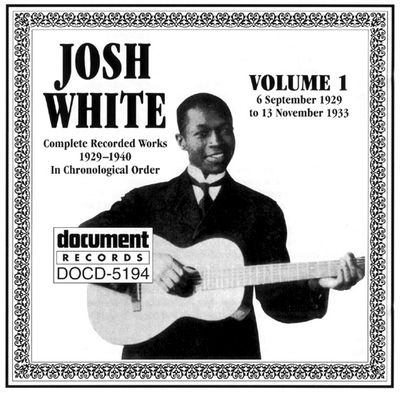
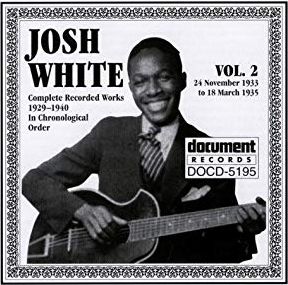
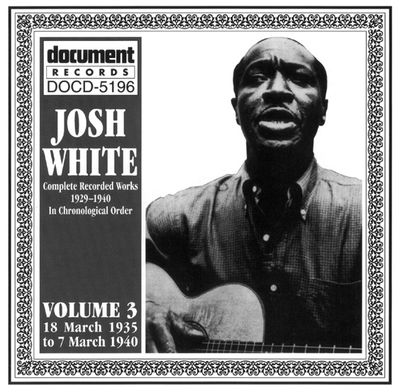
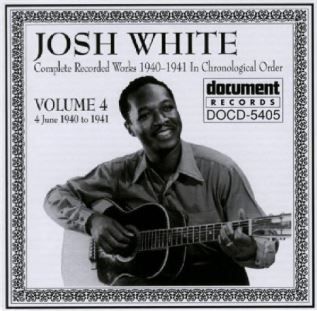
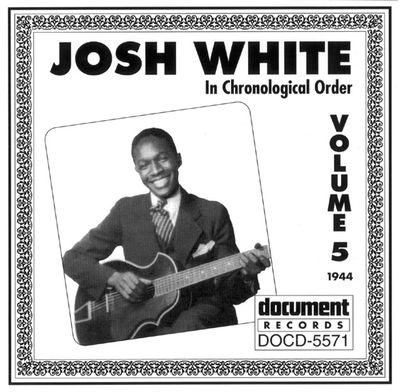
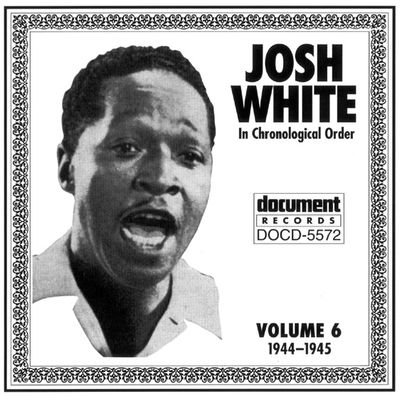
COMPLETE RECORDED WORKS
Document
Volume 1 (June 1929 - November 1933)
Volume 2 (November 1933 - March 1935)
Volume 3 (March 1935 - March 1940)
Volume 4 (June 1940 - 1941)
Volume 5 (1944)
Volume 6 (March 1944 - December 1945)
Fils de Dennis et Daisy Elizabeth White, il est né dans le quartier noir de Greenville. Dès l'enfance, Josh chante à l'église avec ses parents (son père est révérend). Il commence à jouer de la musique dans les rues avec Blind Man Arnold. Josh assimile les influences de Blind Blake et développe une technique virtuose à la guitare. Repéré à Chicago en 1927 par le producteur J. Mayo Williams, Josh devient un session man pour Paramount et grave quelques morceaux avec Blind Joe Taggart alors qu'il n'est encore qu'un adolescent. En 1930, il enregistre pour ARC (American Record Company) sous l'impulsion des producteurs Art Satherley et W.R. Callaway. D'abord sous le nom de Joshua White the Singing Christian, il délivre de remarquables morceaux comme "Black and evil blues", "Little brother blues", "Crying blues", "Double crossing blues", "Jesus gonna make up my dying bed", "There's a man goin' round takin' names". Souvent seul à la guitare, il profite parfois du support des pianistes Clarence Williams, Leroy Carr, Walter Roland ("Welfare blues"). Mais, en 1936, Josh se blesse gravement à la main gauche lors d'un accident domestique et échappe de peu à l'amputation. Il lui faudra fournir un effort surhumain pendant trois années pour retrouver sa dextérité à la guitare. Après cet accident et sa rééducation, Josh retrouve le chemin des studios en mars 1940. Il grave "Milk cow blues" avec le clarinettiste de jazz Sidney Bechet. Dès le début des années 40, il s'éloigne nettement du Blues enregistrant beaucoup de pièces religieuses ou des titres Folk pour les labels Decca, Asch et Stinson.
Son of Dennis and Daisy Elizabeth White, he was born in the black neighborhood of Greenville. From childhood, Josh sang in church with his parents (his father is a reverend). He starts playing music on the streets with Blind Man Arnold. Josh assimilates the influences of Blind Blake and develops a virtuoso technique on guitar. Spotted in Chicago in 1927 by producer J. Mayo Williams, Josh became a session man for Paramount and engraved a few songs with Blind Joe Taggart when he was still a teenager. In 1930, he recorded for ARC (American Record Company) under the leadership of producers Art Satherley and W.R. Callaway. First under the name of Joshua White the Singing Christian, he delivers remarkable songs like "Black and evil blues", "Little brother blues", "Crying blues", "Double crossing blues", "Jesus gonna make up my dying bed", "There's a man goin' round takin' names". Often alone on guitar, he sometimes has the support of pianists Clarence Williams, Leroy Carr, Walter Roland ("Welfare blues"). But, in 1936, Josh was seriously injured in the left hand in a domestic accident and narrowly escaped amputation. He will have to make a superhuman effort for three years to regain his dexterity on guitar. After this accident and his rehabilitation, Josh returned to studios in march 1940. He recorded "Milk cow blues" with the jazz clarinetist Sidney Bechet. From the early 1940's, he moved away from the Blues, recording many religious pieces or Folk titles for the Decca, Asch and Stinson labels.
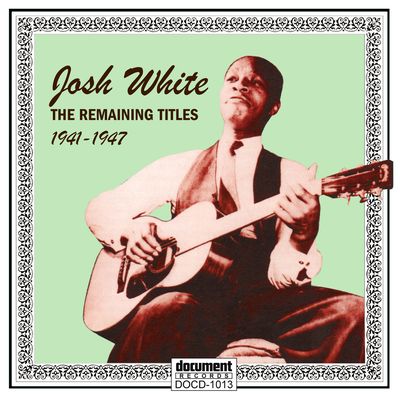
THE REMAINING TITLES
Document
1941 - 1947
On trouve dans ce CD des titres Folk pour Keynote, des morceaux dans lesquels il accompagne la chanteuse Libby Holman ainsi que ses enregistrements au sein des Union Boys avec Brownie Mac Ghee et Sonny Terry ("Move into Germany"). Le programme est plutôt intéressant mais doit être conseiller avant tout aux complétistes.
This CD contains Folk songs for Keynote, songs in which he accompanies singer Libby Holman and his recordings as part of the Union Boys with Brownie Mac Ghee and Sonny Terry ("Move into Germany"). The program is rather interesting but should be recommended above all to completists.
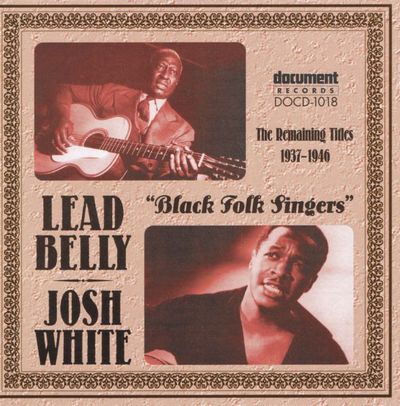
BLACK FOLK SINGERS : THE REMAINING TITLES
Document
March 1944 - May 1946
On retrouve ici des titres épars provenant des labels Asch, Stinson et Folkways. Il y a aussi quelques plages pour l'armée américaine (American Forces Radio Service). On peut ressortir "Hold on" avec Brownie Mac Ghee et Pete Seeger, "One meat ball", "In my time of dying". Un contenu qui ici aussi devrait plutôt intéresser les fans confirmés ou les complétistes. A signaler également que certains titres doublonnent avec le CD "Free and equal blues".
Here we find scattered titles from the Asch, Stinson and Folkways labels. There are also some tracks for the american army (American Forces Radio Service). We can point out "Hold on" with Brownie Mac Ghee and Pete Seeger, "One meat ball", "In my time of dying". Content that here too should rather interest confirmed fans or completists. Also note that some titles are also in "Free and equal blues" CD.
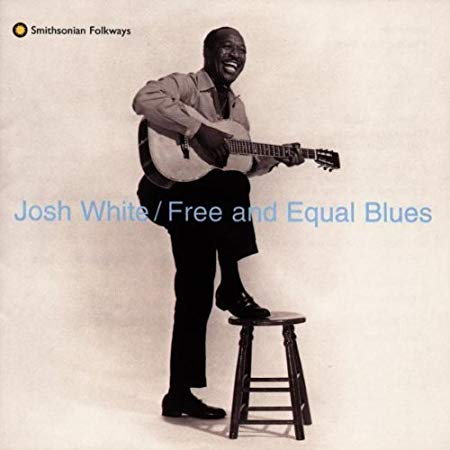
FREE AND EQUAL BLUES
Smithsonian - Folkways
March 1944 - May 1946
A New York, Josh White prend part au mouvement folk progressiste aux côtés de Charles & Pete Seeger ou Burl Ives notamment autour de Greenwich Village. Il travaille notamment pour les labels de Moses Asch et Herbert Harris : Asch, Folkways, Disc. Ces enregistrements lui permettent de toucher un nouveau public blanc étudiant. Ce CD concocté par Jeff Place, Elijah Wald et Kip Lornell reprend la production pour ces labels (avec environ un tiers d'inédits). On peut retenir de superbes versions de "Jim Crow", "Landlord", "TB blues", "Hold on" (avec ses Union Boys, Brownie Mac Ghee et Pete Seeger), "Mean mistreatin' woman", "Freedom road" (dont les paroles furent écrites par Langston Hughes). D'autres passages sont par contre bien ennuyeux. A noter que quelques titres doublonnent avec le CD "Black folk singers".
In New York, Josh White takes part in the progressive folk movement alongside Charles & Pete Seeger or Burl Ives especially around Greenwich Village. He works notably for the labels of Moses Asch and Herbert Harris : Asch, Folkways, Disc. These recordings allow him to reach a new white student audience. This CD concocted by Jeff Place, Elijah Wald and Kip Lornell resume production for these labels (with around a third of previously unissued titles). We can point out superb versions of "Jim Crow", "Landlord", "TB blues", "Hold on" (with his Union Boys, Brownie Mac Ghee and Pete Seeger), "Mean mistreatin' woman", "Freedom road" (the lyrics were written by Langston Hughes). Others passages are however annoying. Also note that some titles are also in "Black folk singers" CD.
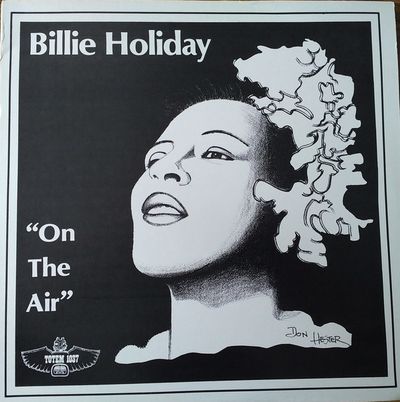
ON THE AIR
Totem
June 1944
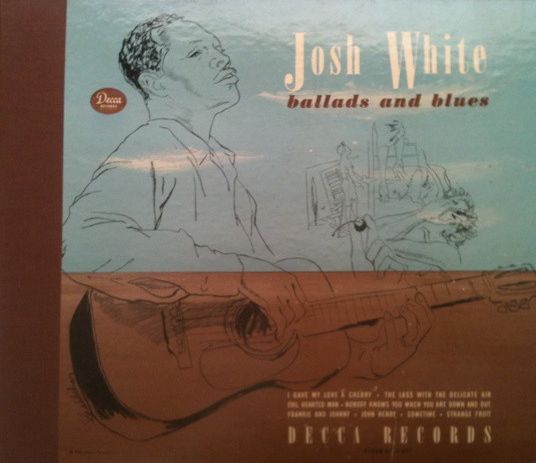
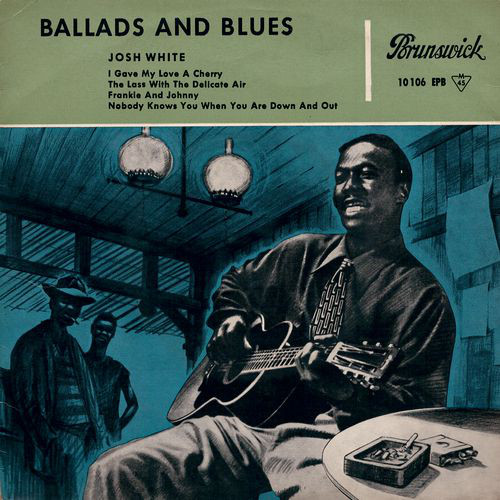
BALLADS AND BLUES
Decca
Brunswick
December 1944 - March 1946
Il ne faut pas confondre ce recueil avec celui du même nom proposé par Elektra. Sont rassemblées ici des séances pour Decca entre Blues et Folk. On apprécie l'excellent "Evil hearted man". Josh White y est souvent accompagné de John Simmons (contrebasse) et J.C. Heard ou son frère Bill White derrière la batterie. On entend même Brownie Mac Ghee et Sonny Terry sur certaines plages ("Sometime").
This collection should not be confused with that of the same name issued by Elektra. Here are gathered sessions for Decca between Blues and Folk. We appreciate the excellent "Evil hearted man". Josh White is often accompanied by John Simmons (bass) and J.C. Heard or his brother Bill White behind the drums. We even hear Brownie Mac Ghee and Sonny Terry on some tracks ("Sometime").
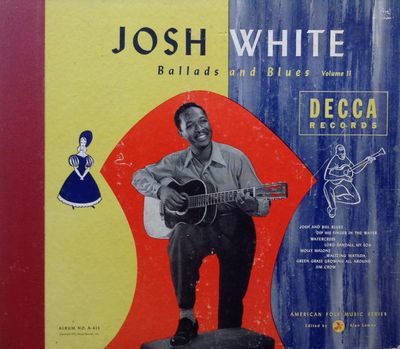
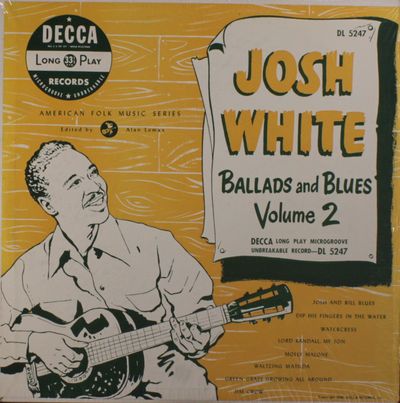
BALLADS AND BLUES vol.2
Decca
Brunswick
December 1944 - May 1947
Suite des séances Decca réalisées entre 1944 et 1947. On peut ressortir de cet album le superbe "Josh and Bill blues" mais le reste du programme n'est pas très intéressant. Après les enregistrements Decca, Josh n'enregistre plus rien aux Etats-Unis empêché par la commission Mac Carthy qui le suspecte d'être membre du parti communiste (ce qu'il ne sera jamais).
Continuation of the Decca sessions carried out between 1944 and 1947. We can highlight from this album the superb "Josh and Bill blues" but the rest of the program is not very interesting. After the Decca recordings, Josh does not record anything in the United States prevented by the Mac Carthy commission which suspects him of being a member of the communist party (which he never will be).
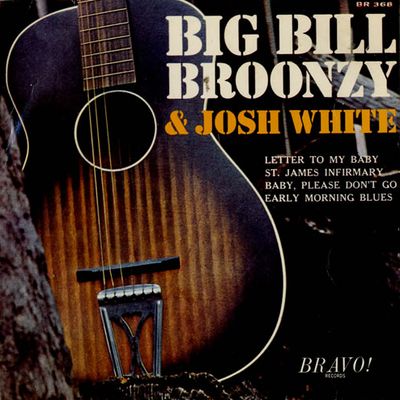
BIG BILL BROONZY & JOSH WHITE (EP)
Bravo
June 1950
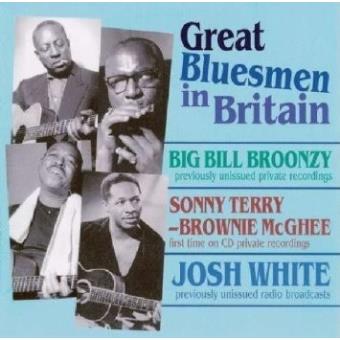
GREAT BLUESMEN IN BRITAIN
Avid
July 1950
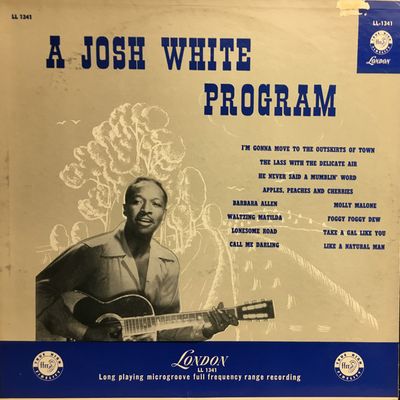
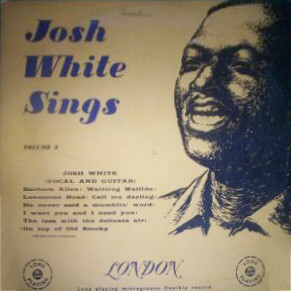
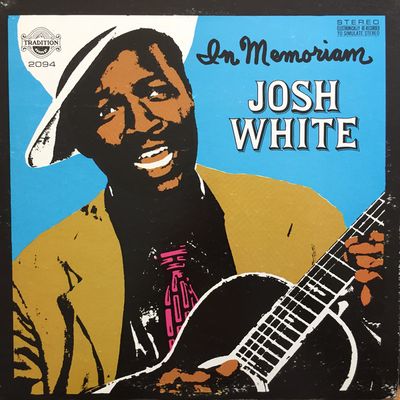
A JOSH WHITE PROGRAM
London
JOSH WHITE SINGS vol.2
London
IN MEMORIAM
Tradition
July 1950 / March 1951
Pour sa première venue en Europe en 1950, Josh White enregistre en France puis en Angleterre avec des jazzmen locaux. En fait, il y a deux séances distinctes ici, la première en juillet 1950 et la seconde en mars 1951. Malheureusement, le programme semble bien suranné aujourd'hui à l'exception peut être du seul blues "I'm gonna move to the outskirts of town".
For his first visit to Europe in 1950, Josh White recorded in France and then in England with local jazzmen. In fact, there are two separate sessions here, the first in july 1950 and the second in march 1951. Unfortunately, the program seems really old-fashioned today with the exception maybe of the only blues "I'm gonna move to the outskirts of town".
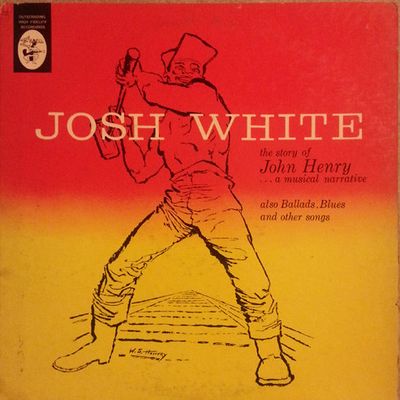
THE STORY OF JOHN HENRY
Elektra
1954 - 1955
Grâce à Elektra, le label de Jac Holzman, Josh White revient enregistrer dans les studios new-yorkais après plusieurs années d'absence. Sa collaboration avec ce label durera jusqu'à la fin de sa carrière. Ici, Josh évoque l'histoire du célèbre héros du folklore américain John Henry. Il alterne la narration de l'histoire et les parties chantées. Il y a aussi quelques morceaux comme "Free and equal blues" ou "You don't know my mind". Un opus plutôt atypique mais intéressant à conseiller aux amateurs confirmés.
Thanks to Elektra, Jac Holzman's label, Josh White comes back in New York studios to record after several years of absence. His collaboration with this label will last until the end of his career. Here, Josh tells the story of the famous hero of American folklore John Henry. He alternates the narration of the story and the sung parts. There are also some songs like "Free and equal blues" or "You don't know my mind". A rather atypical but interesting opus to recommend to experienced amateurs.
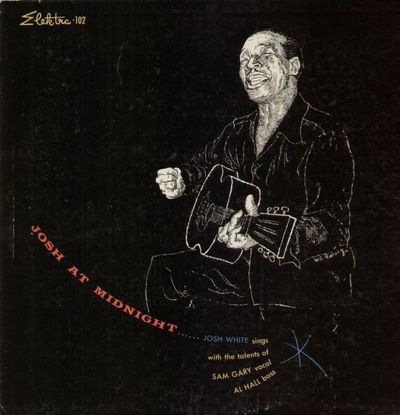
JOSH AT MIDNIGHT
Elektra
1955
Nouveau disque pour Elektra dans lequel Josh White est accompagné de Sam Gary et Al Hall. On trouve une sympathique lecture du traditionnel "Saint James infirmary" et de belles versions de "Jesus gonna make up my dyin' bed", "Jelly jelly", "One meat ball" et "Takin' names". Un programme entre Blues, Folk et spirituals dynamique et entrainant.
New album for Elektra in which Josh White is accompanied by Sam Gary and Al Hall. We find a nice reading of the traditional "Saint James infirmary" and beautiful versions of "Jesus gonna make up my dyin' bed", "Jelly jelly", "One meat ball" and "Takin' names". A dynamic and lively program between Blues, Folk and spirituals.
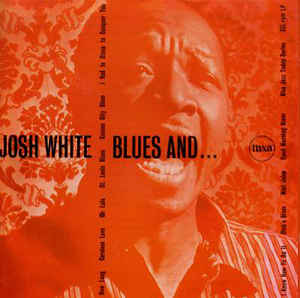
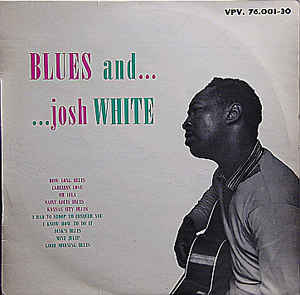
BLUES AND
Nixa
Pye
January 1956
A nouveau en Grande Bretagne en 1956, Josh grave cet album accompagné sur la moitié des titres par un sextet de jazz. De superbes et atypiques versions de "Careless love", "Saint Louis blues", "I had to stoop to conquer you", "Mint julep" et de belles interactions entre ces jazzmen et la guitare de Josh White.
Again in Great Britain in 1956, Josh recorded this album accompanied on half of the titles by a jazz sextet. Superb and atypical versions of "Careless love", "Saint Louis blues", "I had to stoop to conquer you", "Mint julep" and beautiful interactions between these jazzmen and Josh White's guitar.
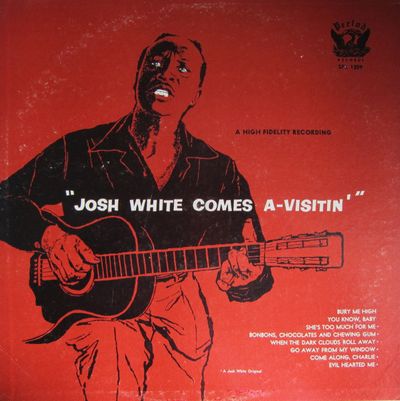
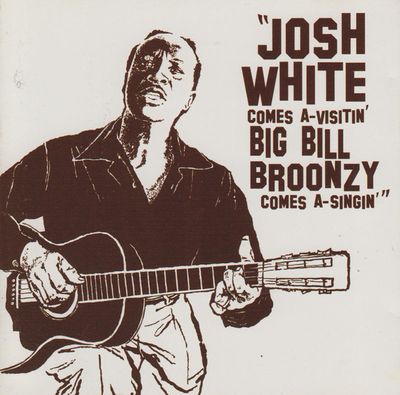
COMES A VISITIN'
Period
1956
Voici un album mineur dans la discographie hétéroclite de Josh White. La set list est molle et peu inspirée, bien loin du Blues et du Folk qui l'ont rendu célèbre.
Here is a minor album in Josh White's heterogeneous discography. The set list is weak and uninspired, far from the Blues and Folk that made him famous.
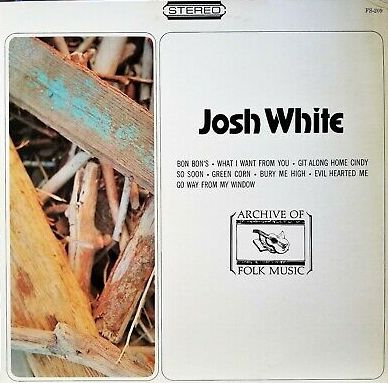
JOSH WHITE
Archive of Folk
Everest
1956
Dans ce microsillon, on trouve quatre morceaux inédits provenant probablement de la séance précédente.
In this record, we find four unissued tracks probably coming from the previous session.
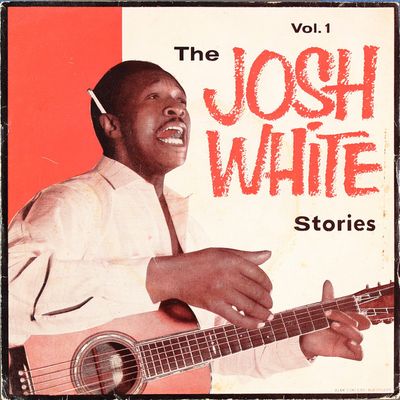
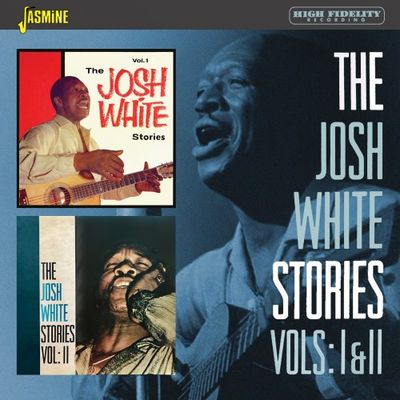
THE JOSH WHITE STORIES vol.1
ABC - Paramount
Jasmine
April 1956
Sous la supervision du producteur Creed Taylor, Josh grave substantiellement pour ABC - Paramount en 1956-57. Placé en leader d'un petit orchestre de jazz, Josh chante son répertoire habituel entre airs traditionnels, folk, blues et spirituals. Quelques bons blues sont au programme comme "I'm a mean mistreater" et l'excellent "Dupree blues". Un disque plutôt plaisant réédité en CD par Jasmine.
Under the supervision of producer Creed Taylor, Josh substantially recorded for ABC - Paramount in 1956-57. Josh sings as the leader of a small jazz orchestra his usual repertoire between traditional tunes, folk, blues and spirituals. Some good blues are on the program like "I'm a mean mistreater" and the excellent "Dupree blues". A rather pleasant disc reissued on CD by Jasmine.
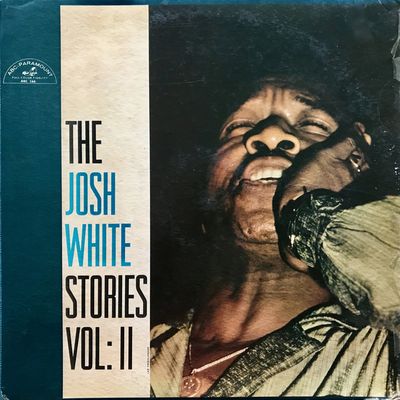
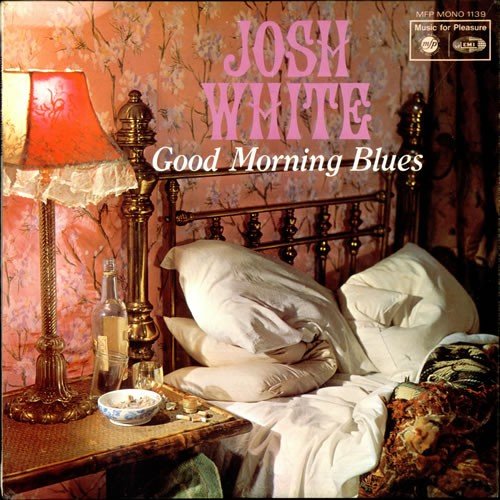

THE JOSH WHITE STORIES vol.2
ABC - Paramount
Jasmine
GOOD MORNING BLUES
Music for Pleasure
November 1956 - February 1957
Suite des séances pour ABC - Paramount, Josh propose ici un superbe "Good morning blues" et de très beaux moments comme "The grey goose", "Two little fishes", "Red river". Ici aussi l'ensemble reste plutôt plaisant. Il a fallu attendre 2020 pour que le label Jasmine propose les deux volumes de "The Josh White stories" en CD.
Following of the ABC - Paramount sessions, Josh delivers here a superb "Good morning blues" and very beautiful moments like "The gray goose", "Two little fishes", "Red river". Here too, the whole is rather pleasant. It was not until 2020 that the Jasmine label released the two volumes of "The Josh White stories" on CD.
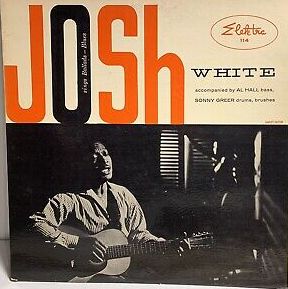
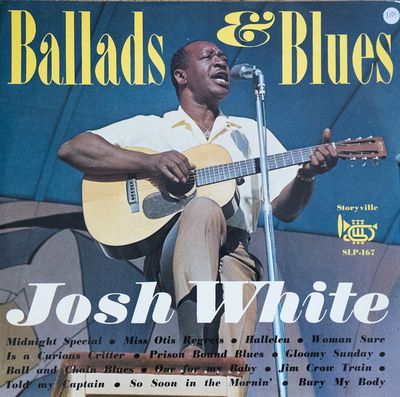
JOSH WHITE SINGS BALLADS AND BLUES
Elektra
Storyville
December 1956
Nouvelle séance pour Elektra dans les derniers jours de l'année 1956. En bonne forme, Josh est supporté par Al Hall (basse) et Sonny Greer (batterie). Le trio délivre une bonne prestation en particulier sur "Midnight special", "Prison bound blues", "Ball and chain blues" et "Bury my body".
New session for Elektra in the last days of 1956. In good shape, Josh is supported by Al Hall (bass) and Sonny Greer (drums). The trio delivers a good performance especially on "Midnight special", "Prison bound blues", "Ball and chain blues" and "Bury my body".
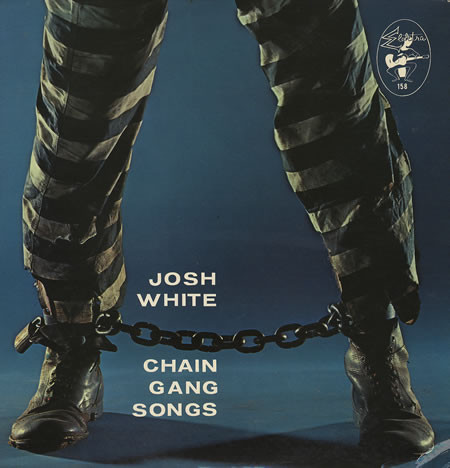
CHAIN GANG SONGS
Elektra
1958
Dans ce nouvel opus pour Elektra, Josh s'est concentré sur des spirituals et des airs folkloriques. Le programme semble très inégal et il n'y a pas beaucoup de blues à part "Did you ever love a woman".
In this new opus for Elektra, Josh focused on spirituals and folk tunes. The program looks very uneven and there are not a lot of blues except "Did you ever love a woman".
[no image]
ART FORD'S JAZZ PARTY BROADCASTS
Jazz Connoisseur (only on cassette)
August 1958
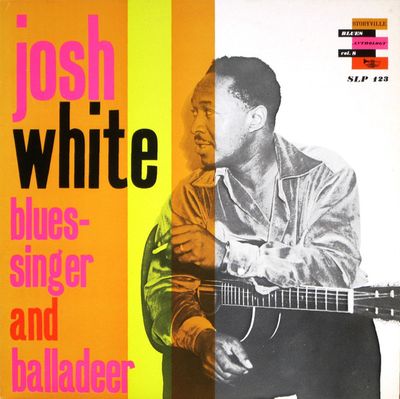
BLUES SINGER AND BALLADEER
Storyville
June 1959
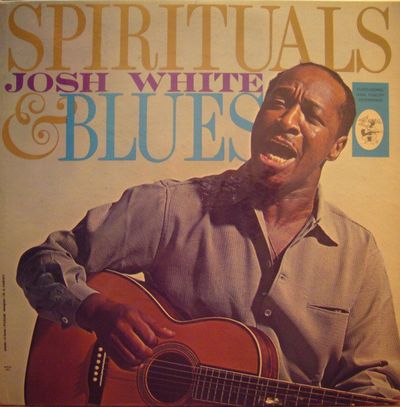
SPIRITUALS AND BLUES
Elektra
Storyville
1960
On trouve ici quelques faces sympathiques comme "Silicosis blues", "Black snake", "I've got that pure religion", "Southern exposure". Comme le titre l'indique, on passe d'un blues à une pièce religieuse. On note la participation de son fils Josh White Jr au chant sur deux titres.
We find here some nice sides like "Silicosis blues", "Black snake", "I've got that pure religion", "Southern exposure". As the title suggests, we pass from a blues to a religious piece. We note the participation of his son Josh White Jr singing on two titles.
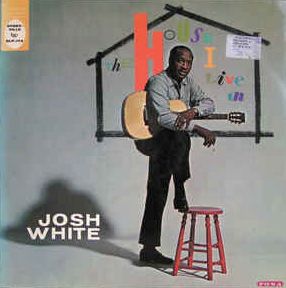
THE HOUSE I LIVE IN
Elektra
Storyville
1960
Cet album a probablement été enregistré lors des mêmes séances que le précédent. Une excellente version de "Good morning blues" avec le piano d'Harold Mabern Jr et le saxophone de George Coleman. On peut ressortir également "Mean mistreater", "Blind man stood on the road and cried", "TB blues".
This album was probably recorded during the same sessions as the previous one. An excellent version of "Good morning blues" with the piano of Harold Mabern Jr and the saxophone of George Coleman. We can also highlight "Mean mistreater", "Blind man stood on the road and cried", "TB blues".
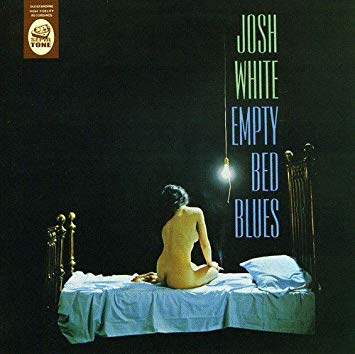
EMPTY BED BLUES
Elektra
1960
Sur cet album, Josh opte pour une orchestration entre Blues et Jazz. Les musiciens sont restés inconnus selon la discographie officielle à l'exception du contrebassiste Bill Lee. "Empty bed blues", "Mother on that train", "Baby baby blues" figurent parmi les meilleurs moments du disque.
On this album, Josh opts for an orchestration between Blues and Jazz. The musicians remained unknown according to the official discography except for the bass player Bill Lee. "Empty bed blues", "Mother on that train", "Baby baby blues" are among the best moments of the record.

LIVE
ABC - Paramount
April 1961
Il n'y a pas beaucoup de témoignage en public de Josh White. Celui-ci a été capturé sur une scène londonienne en avril 1961. Globalement un peu ennuyeux malgré des moments prenants comme "Betty and Dupree", "You know baby" et "Strange fruit".
There is not much live albums of Josh White. This one was captured on a London scene in april 1961. Overall a bit boring despite engaging moments like "Betty and Dupree", "You know baby" and "Strange fruit".
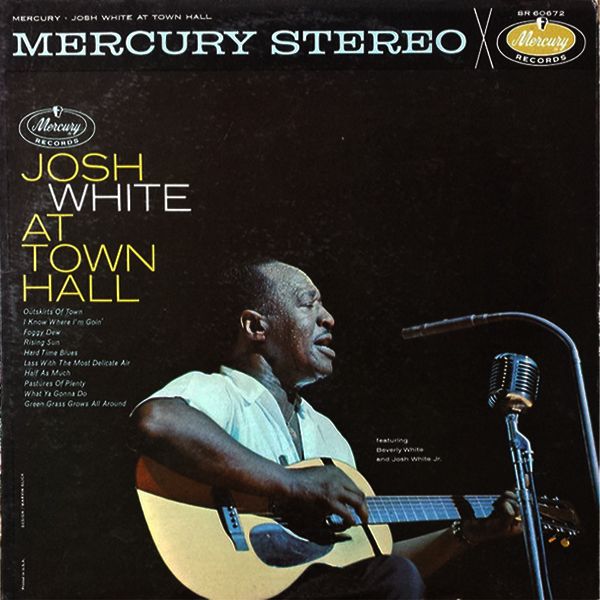
JOSH WHITE AT TOWN HALL
Mercury
September 1961
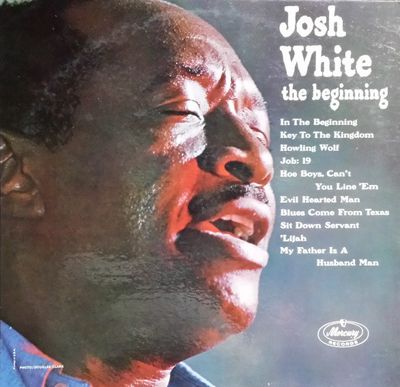
THE BEGINNING vol.1
Mercury
January 1963
Sous l'impulsion de son ami Alan Ribback (propriétaire du Gate of Horn) et du producteur Frank Fried, des séances d'enregistrements sont mises sur pied dans le but de recréer l'ambiance de ses premiers titres d'avant guerre. Dans les premiers jours de 1963, Josh se retrouve donc à Chicago, où il n'a pas beaucoup enregistré, avec notamment l'harmoniciste "Sonny Boy" Williamson et quelques jazzmen pour des séances résolument blues. Le résultat est superbe avec des moments intenses pleins de feeling comme "Howlin' wolf", "In the evening", "Blues come from Texas" et le sublime "Evil hearted man".
Under the impulse of his friend Alan Ribback (owner of the Gate of Horn) and the producer Frank Fried, recording sessions are set up with the aim of recreate the atmosphere of his first pre-war titles. In the early days of 1963, Josh found himself in Chicago, where he did not record much, with in particular the harmonica player "Sonny Boy" Williamson and some jazzmen for resolutely blues sessions. The result is superb with intense moments full of feeling like "Howlin' wolf", "In the evening", "Blues come from Texas" and the sublime "Evil hearted man".
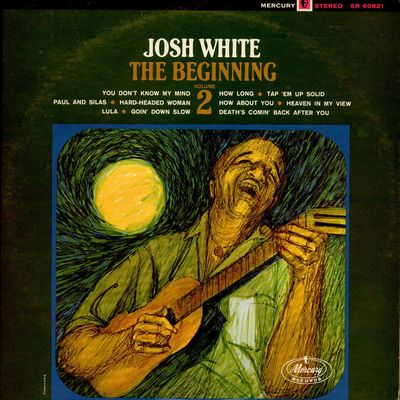
THE BEGINNING vol.2
Mercury
January 1963
Suite des séances chicagoanes pour le label Mercury associant Josh White et quelques remarquables musiciens "Sonny Boy" Williamson, Floyd Morris parmi d'autres. Dans ce second volume, on peut ressortir aussi de franches réussites comme "You don't know my mind", "Hard headed woman", "Goin' down slow", "Death's comin' back after you".
Following of chicagoan sessions for the Mercury label associating Josh White and some remarkable musicians "Sonny Boy" Williamson, Floyd Morris among others. In this second volume, we can also highlight frank achievements like "You don't know my mind", "Hard headed woman", "Goin' down slow", "Death's comin' back after you".
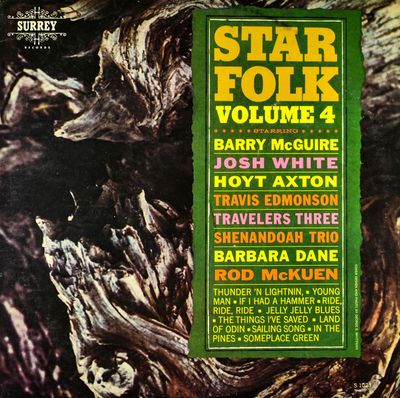
STAR FOLK vol.4
Surrey
1965
Dans cette anthologie, on trouve deux morceaux initialement prévus pour le label Mirwood : "Jelly jelly blues" et "In the pines".
In this anthology, there are two tracks originally recorded for the Mirwood label : "Jelly jelly blues" and "In the pines".
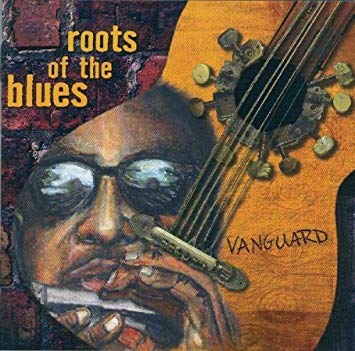
ROOTS OF THE BLUES
Vanguard
July 1965
Un titre sur la scène du célèbre festival folk de Newport.
A title on the stage of the famous Newport folk festival.